Boldly imagined and exquisitely written, For the Most Beautiful, a debut novel by classicist Emily Hauser, chronicles the defeat of Troy through the eyes of female characters almost entirely disregarded in Homer’s Iliad — Briseis, princess of Pedasus, and Krisayis, daughter of the High Priest of Troy. In this Ancient History Encyclopedia (AHE) exclusive, James Blake Wiener interviews Emily Hauser, asking questions as to the difficulties she faced in writing her first novel, and why ancient Troy lingers so vividly in the western imagination.
JW: Emily Hauser, welcome to Ancient History Encyclopedia (AHE) and congratulations on your new novel, For the Most Beautiful.
What it is about ancient Greece that captivates and beguiles you? Why do you feel such a strong personal attraction to ancient Greek literature and culture?
EH: Thank you for the welcome, and I am glad to be here! For me it is the richness of Greek mythology, combined with the amount of evidence we have of the real history of the Greeks and Trojans, that really draws me in. I have always been fascinated by the Greek gods and heroes — bizarre tales that range from Zeus, the king of the gods, giving birth to Athena from his head, and heroes who ride flying horses. But I also love thinking about the real men and women who made up ancient Greek society. I am fascinated by using recent finds in archaeology and the evidence we have from ancient texts to find out all about their lives — and I love using that historical evidence blended with the rich, complicated myths of Greece to bring the people of the Bronze Age alive in my novels.
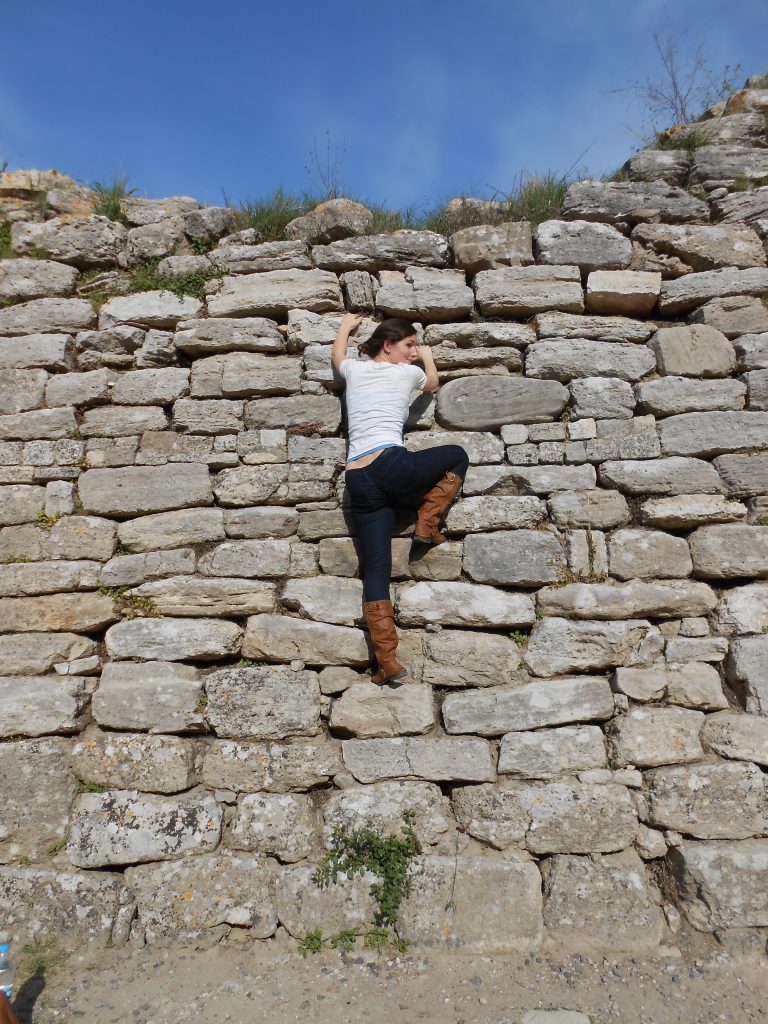
Emily Hauser climbs the fabled walls of Illium in present-day Turkey. (Photo courtesy of Emily Hauser.)
JW: It seems that there have been many excellent novels released in the past decade or so set during the Trojan War — I think immediately of Margaret George’s Helen of Troy, Margaret Atwood’s Penelopiad, and Madeline Miller’s The Song of Achilles.
Why did you choose to set a novel in Bronze Age Troy, and why do so many of us continue to return to the Iliad, time after time, for inspiration and literary solace?
EH: You are right, there has been a real upswing in interest in Troy and the Iliad over the past few years. It is something that I am really interested in, and it also forms a part of my research. I think there is something about the Trojan War that keeps on appealing to us: Not just the timelessness of the myths themselves, but also the fact that so many other people through the ages have turned to the Iliad and the stories of Troy as something that was “good to think with.”
For me, writing For the Most Beautiful was a way in which to engage with this rich treasure-trove of myth and literature, but from a different point of view. By telling the stories of the women of the Trojan War, like Helen, Penelope, or Briseis and Chryseis/Krisayis (as in my novel), we see something we think we know through new eyes.
JW: The protagonists in For the Most Beautiful — Briseis and Krisayis — are female. Why did you pen a novel from an entirely female perspective? What challenges did you face in doing so and was this something that you had always wanted to do?
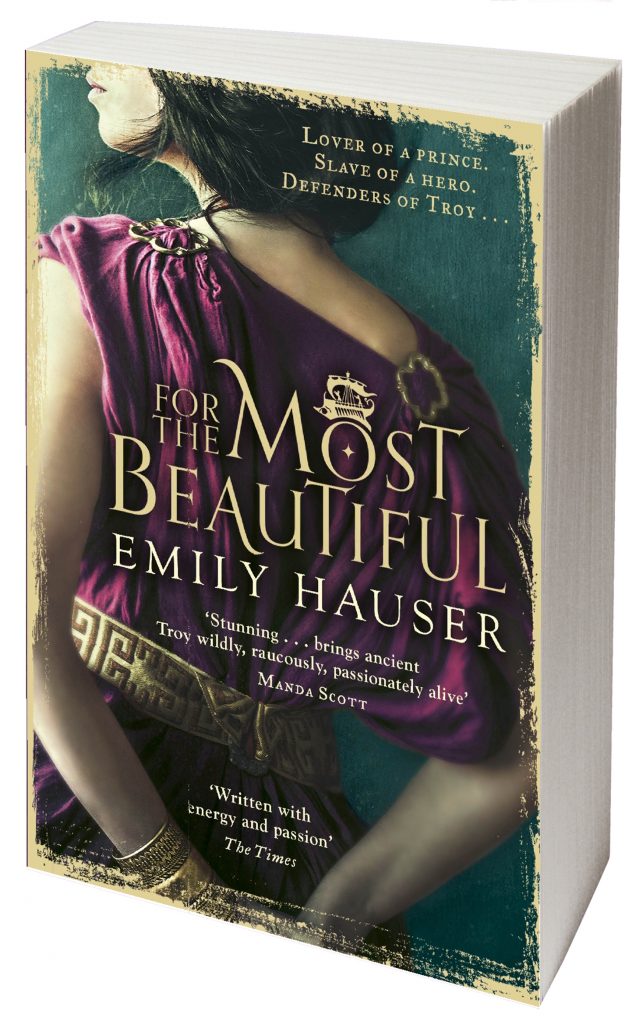
For the Most Beautiful is Emily Hauser’s debut novel. It is available in hardback and paperback in the UK and USA.
EH: I became interested in the women of the Iliad while I was studying for my undergraduate degree in Classics at Cambridge. I wrote my thesis on the Iliad and the parts of it that really struck me were those fleeting moments where we get a glimpse of the women behind the walls of Troy — Helen, weaving her tapestry; Andromache, looking after her infant son. A few years later I read Margaret Atwood’s Penelopiad, and I immediately thought, “Why hasn’t anyone done this for the Iliad?” And that’s how For the Most Beautiful began. I really wanted to capture the other side of the Trojan War — the one we rarely see, because women were not given a voice, and one which is so important to understanding what the war was all about. I felt that readers of the Iliad often dismiss it as just a tale of blood and war and men, and I wanted to demonstrate that there is something more, something deeper — another way of seeing the tale.
JW: I am curious to know how you researched and wrote your novel; which sources did you scrutinize and study, and what surprises did you uncover, if any, about Bronze Age Greece or Asia Minor?
EH: I spent many happy hours in the libraries at Harvard and Yale, hunting down books and maps on the Trojan War. It was really important to me in writing For the Most Beautiful to use my training as a classicist to really bring the Trojan world alive, to make it as historically accurate as possible.
My husband and I additionally visited the site of Troy, and I contacted the current director of excavations to make sure I knew about recent archaeological finds at the site; I even met with an environmental archaeologist to research which trees, plants and crops would have been growing in Bronze Age Troy. One of the most fascinating things I discovered was that the cult of the Greek god Apollo most likely actually came from the area around Troy, in modern Turkey (where he was known as Apulunas). It was an exciting glimpse into the kinds of gods the Trojans themselves might have believed in, which we do not otherwise have much evidence for.
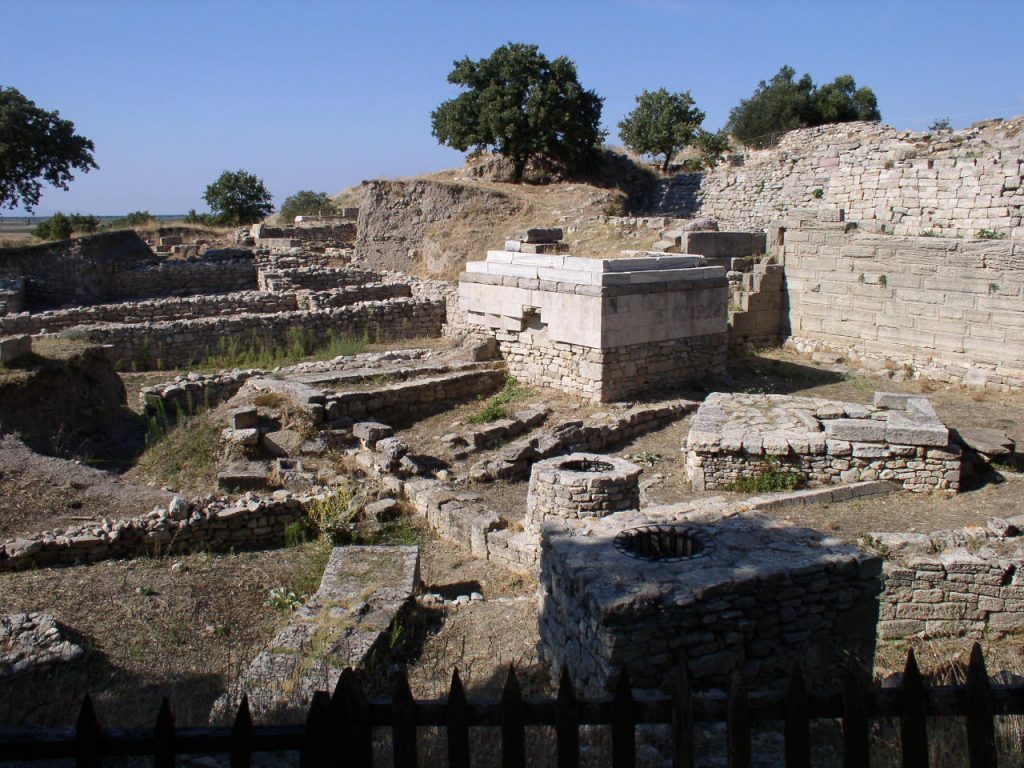
Ruins of ancient Troy in present-day Turkey. (Photo courtesy of Emily Hauser.)
“I am fascinated by using recent finds in archaeology and the evidence we have from ancient texts to find out all about their lives — and I love using that historical evidence blended with the rich, complicated myths of Greece to bring the people of the Bronze Age alive in my novels.” ~Emily Hauser
JW: Do you believe that there was a historical Trojan War? Was Homer was a real person? Or are these questions immaterial given the importance of the Homeric epics to Western civilization, Emily?
EH: It is a vexed question, and one that has been argued over for hundreds, if not thousands, of years. Yet I think it is important to ask it, and to attempt to give an answer — if we do not, we disconnect the Homeric texts from their history and transmission, which is central to how they came to be formed in the first place. As a researcher, my opinion is that there was a historical Trojan War (which is corroborated in the archaeological evidence at Troy), but that it was both shorter and less dramatic than it was later made out to be in the Homeric epics.
It also seems to me to make sense that, while Homer may have existed, he was probably less a real person than a representation of a sequence of many different poets, who sang epic poems about the fall of Troy. As a novelist, however, I love imagining Homer the poet watching the fall of Troy, and it is something I played with in the last scene of For the Most Beautiful.
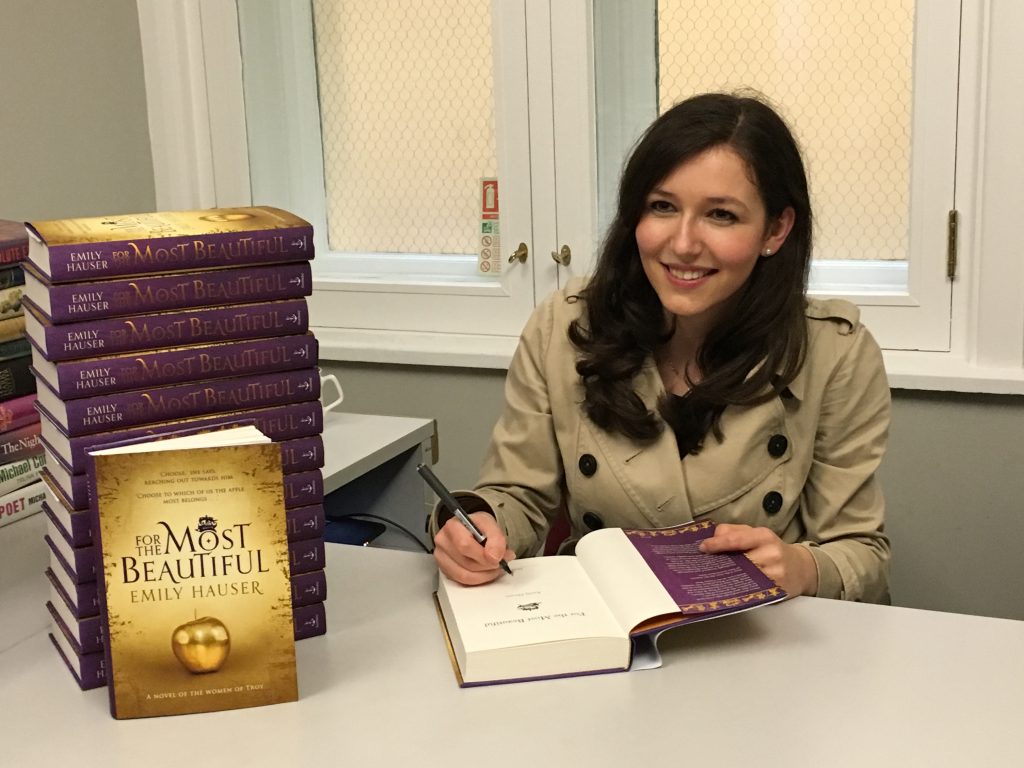
Emily Hauser is a classicist, author and researcher. She is currently completing her doctorate degree in Classics at Yale University.
JW: For the Most Beautiful is the first book in the “Golden Apple Trilogy.” Your next book, For the Winner will be released in 2017. Will you ever continue to narrate the adventures of Briseis or Krisayis?
EH: For the Winner actually moves back in time several years before the Trojan War, and tells the story of Atalanta, the only woman to voyage with Jason and the Argonauts for the Golden Fleece. She is a brilliant character, feisty and determined. The myths of the Greeks tell us that Atalanta (whose name means “the equal of all others”) was exposed by her father at birth because she was a girl; in spite of that, she raised herself and taught herself to fight just as well as a man; she became the fastest runner in ancient Greece; and (according to one version of the legend) she fought alongside Jason and the Argonauts. My next novel is not only about the story of Atalanta — there is also a golden apple in there too…
JW: Finally Emily, what advice do you have to aspiring novelists or academics drawn to the Classics?
EH: My advice would be to keep thinking creatively about Classics, and not simply along traditional or familiar lines — the classical world is even richer when you think outside the box and learn to see old stories in new ways!
JW: Emily, thank you so much for speaking with me. I look forward to reading For the Winner next year!
EH: Thank you so much, James. It has been a pleasure.
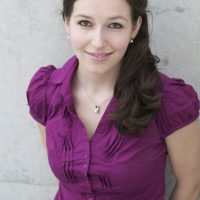 Born in Brighton and brought up in Suffolk, England, Emily Hauser studied Classics at Cambridge where she was taught by Dr. Mary Beard. She then went to Harvard as a Fulbright Scholar and now studies and teaches at Yale, where she is completing her PhD. For the Most Beautiful is her first novel. Hauser’s main interests are in archaic Greek poetry, women in antiquity, gender studies, outreach, and classical reception, with a focus on the reception of classical women in contemporary female-authored fiction. Hauser’s dissertation and first book project, Since Sappho: Women in Classical Literature and Contemporary Women’s Writing, explores four women of the ancient world (Helen of Troy, Penelope, Sappho and Lavinia) in conjunction with their reception in female-authored works of modern fiction, including Margaret Atwood’s The Penelopiad and Ursula Le Guin’s Lavinia.
Born in Brighton and brought up in Suffolk, England, Emily Hauser studied Classics at Cambridge where she was taught by Dr. Mary Beard. She then went to Harvard as a Fulbright Scholar and now studies and teaches at Yale, where she is completing her PhD. For the Most Beautiful is her first novel. Hauser’s main interests are in archaic Greek poetry, women in antiquity, gender studies, outreach, and classical reception, with a focus on the reception of classical women in contemporary female-authored fiction. Hauser’s dissertation and first book project, Since Sappho: Women in Classical Literature and Contemporary Women’s Writing, explores four women of the ancient world (Helen of Troy, Penelope, Sappho and Lavinia) in conjunction with their reception in female-authored works of modern fiction, including Margaret Atwood’s The Penelopiad and Ursula Le Guin’s Lavinia.
Headline Image: The Most Beautiful in multiple quantities. (Courtesy of Emily Hauser.)
All images featured in this interview have been attributed to their respective owners. Images lent to AHE by Emily Hause have been done so as a courtesy. Interview edited by James Blake Wiener for AHE. Special thanks is extended to Lily Capewell for helping to facilitate this interview. Unauthorized reproduction is strictly prohibited. All rights reserved. © AHE 2016. Please contact us for rights to republication.

